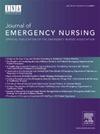韩国老年人在COVID-19之前和期间30天内返回急诊室的特征比较:一项回顾性研究
IF 2.3
4区 医学
Q2 EMERGENCY MEDICINE
引用次数: 0
摘要
导读:由于政府实施的卫生政策,2019年冠状病毒病大流行导致急诊室的可及性发生了重大变化。这些变化影响了老年人返回急诊室就诊的频率,但关于这一主题的实证调查仍然很少。这项研究旨在研究2019年冠状病毒病大流行期间韩国老年人急诊室回访的趋势。方法:纳入2019年至2021年最后一次就诊后30天内返回急诊科的老年人(n = 11034)。分析年龄、性别、视力评分、医保类型、医疗运输方式、急诊科就诊时间、主诉、最终诊断、2019冠状病毒病感染情况、出院计划等数据。结果:总回访次数在2019年(大流行前)最高,2021年(大流行第二年)最低。尽管回访者的总体比例每年都在下降,但在整个研究期间,一组具有较低视力症状的老年人继续出现在急诊科。与此同时,由于复诊总次数减少,合资格入住病人的比例增加。2020年,急诊科的登机时间显著减少,2021年略有增加。最终诊断在3年期间基本保持一致。讨论:尽管对大流行感到担忧,但老年人继续返回急诊室,这可能是由于限制进入当地诊所和暂停家访护理服务。为加强未来大流行期间的卫生保健服务,建议为老年人开发方便、用户友好的在线卫生保健平台。本文章由计算机程序翻译,如有差异,请以英文原文为准。
Comparison of the Characteristics of Korean Older Adults Who Returned to the Emergency Department Within 30 Days Before and During COVID-19: A Retrospective Study
Introduction
The coronavirus disease 2019 pandemic prompted significant alterations in emergency department accessibility owing to government-imposed health policies. These changes influenced the frequency of return emergency department visits among older adults, but empirical investigations on this topic remain scarce. This study aimed to examine trends in emergency department return visits among older adults in South Korea during the coronavirus disease 2019 pandemic.
Methods
Older adults (n = 11,034) who returned to the emergency department within 30 days of their last visits from 2019 to 2021 were included. Data on age, sex, acuity score, health insurance type, medical transportation type, emergency department boarding time, chief complaints, final diagnosis, coronavirus disease 2019 infection status, and discharge plan were analyzed.
Results
The total number of return visits was highest in 2019 (before the pandemic) and lowest in 2021 (the second year of the pandemic). Although the overall proportion of return visitors declined annually, a consistent subgroup of older adults with lower acuity symptoms continued to present to the emergency department throughout the study period. Concurrently, as the total number of return visits decreased, the proportion of those eligible for ward admission increased. Emergency department boarding times decreased markedly in 2020, with a modest increase observed in 2021. Final diagnoses remained largely consistent over the 3-year period.
Discussion
Despite fears related to the pandemic, older adults continued to return to the emergency department likely owing to restricted access to local clinics and the suspension of home visit nursing services. To enhance health care delivery in future pandemics, the development of accessible, user-friendly online health care platforms for older adults is recommended.
求助全文
通过发布文献求助,成功后即可免费获取论文全文。
去求助
来源期刊
CiteScore
3.10
自引率
11.80%
发文量
132
审稿时长
46 days
期刊介绍:
The Journal of Emergency Nursing, the official journal of the Emergency Nurses Association (ENA), is committed to the dissemination of high quality, peer-reviewed manuscripts relevant to all areas of emergency nursing practice across the lifespan. Journal content includes clinical topics, integrative or systematic literature reviews, research, and practice improvement initiatives that provide emergency nurses globally with implications for translation of new knowledge into practice.
The Journal also includes focused sections such as case studies, pharmacology/toxicology, injury prevention, trauma, triage, quality and safety, pediatrics and geriatrics.
The Journal aims to mirror the goal of ENA to promote: community, governance and leadership, knowledge, quality and safety, and advocacy.

 求助内容:
求助内容: 应助结果提醒方式:
应助结果提醒方式:


